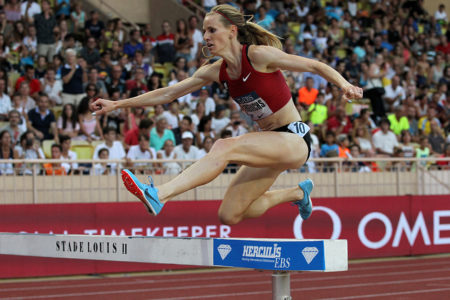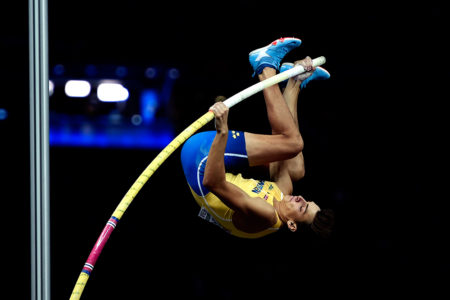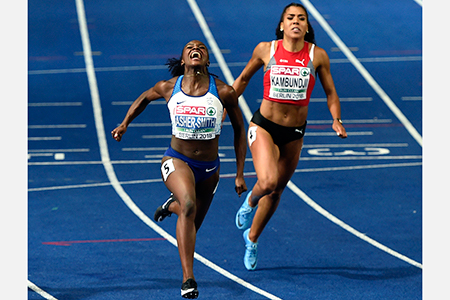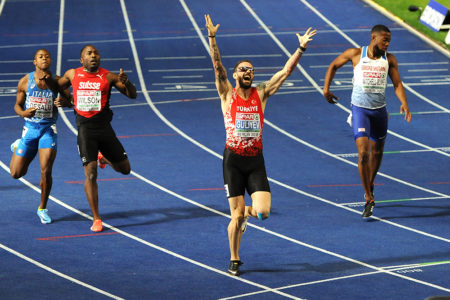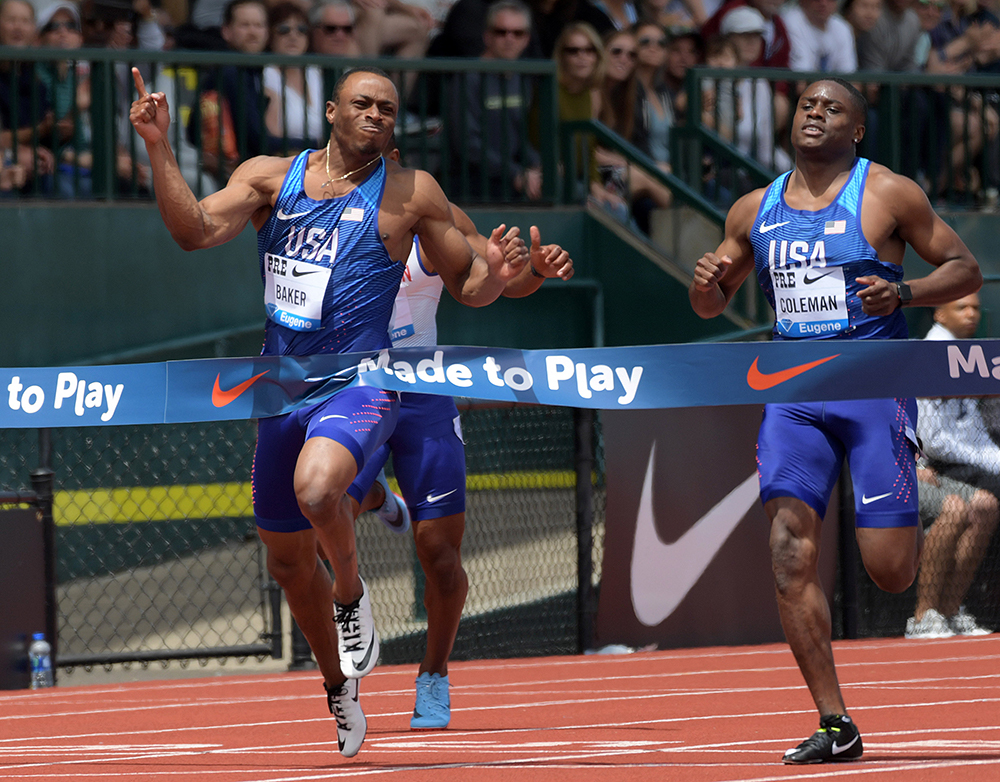
As this summer of sprinting—the first of the post-Bolt era—has unfolded, Ronnie Baker has checked an important box. He has dashed into the thick of the fray and the world knows it.
Much has changed since the end of May, when the 24-year-old Kentucky native won the 100 at the Eugene Diamond League for a second straight year. After sprinting a wind-aided 9.78 on that sunny Saturday afternoon in Eugene to leave Worlds silver medalist Christian Coleman 0.06 in arrears, Baker, just presenting the facts, stated his case for recognition. “I had the fastest time coming in [to the Pre meet] last year, no one talked about me. Not in any of the headlines, none of the media. Same thing this year, I had the fastest time coming in. Still, nothing in the media, nothing about me and I’m coming out here and I run really fast and I win these races against world-class guys and I’m still not mentioned so I definitely believe I should be in the conversation a little bit more.”
As the denouement of the summer campaign approaches he is in all the conversations with DL wins banked at not just Eugene but also Rome, Paris (9.88 PR to equal Noah Lyles’ world lead) and London. Baker has put up the 7 fastest 100 marks of his career this year, averaging 9.902 for his swiftest 5, the sort of quality-in-quantity figure not seen since Justin Gatlin’s ’16 season when the ’17 world champion averaged 9.878.
“There’s been a breakthrough and I just feel like I have kind of less doubt about who I am and what I’m capable of doing,” Baker says. “I think that that’s kind of the biggest thing for me. It’s just more focused and I had a mental breakthrough as far as where I was last year and where I am now. The indoor season was great. It was exciting, I ended up getting a [World Indoor] bronze medal, so that was awesome. I think that it definitely helped me grow as a sprinter and as just a professional athlete in general.”
Although he was World Ranked No. 9 in the 100 last year, before this summer Baker’s reputation centered on indoor success. In ’16 while a TCU senior he set a low-altitude Collegiate Record, 6.47, in winning his second-in-a-row NCAA 60 crown. In ’17 he grabbed the USATF title. At the World Indoor this March he finished in bronze position—doing so, incidentally behind 60 WR-setter Christian Coleman and China’s Bingtian Su, the runners-up in his two Pre 100 wins.
Baker took his 3rd-place finish at the WIC as something of a kick in the rear. “From a professional aspect and just, you know, being in my second year,” he says, “I think that that indoor season helped me a lot. It humbled me and also helped me to really, really hone in and work harder in some of the things that I may have been struggling with. Not only physically but also mentally. And so I think that that even has propelled me to the next level with my outdoor season. I think that even indoors I wasn’t just another guy, but obviously when someone breaks the World Record, you know, that he’s the main focus. So I definitely think it was a very humbling experience. I grew a lot and now I’m in the conversation because I’ve been so consistent and I’ve been more focused this outdoor season.”
No elite athlete reaches that level by a directly linear route, and Baker’s may come as a surprise. The NCAA 60 star now among the world elite in the 100 came to TCU from Ballard High in Louisville as a quartermiler who won State 400 titles as a junior and senior. “Yeah, I did,” he says with a chuckle. “That was my original event. I mean, I ran all three [sprints] in high school, everyone runs all the sprints, you know, run the 4, the 1 and the 2, but the 400 was always my premier event and so that’s what I got recruited to go to TCU for and I think that I was doing some sprint workouts, some quartermile workouts and I was in both groups for most of two years.”
Baker PRed at 46.18 in the 400 as a college frosh but says there was no tectonic shift behind his migration to the short dashes. “Really I just had some good foot speed and it came to a point where I got to choose if I wanted to run the 4 or the 1 and 2, and after I got the choice I never did the 400 again. I never did the open quarter after my sophomore year of college. I mean, the 400 wasn’t my favorite event by any stretch, but I just, I feel like it always goes the other way around. People always want to be a 100m sprinter and then they end up going the opposite way, so they end up being 400, 800, mile people. But I was a special case and I went the other way. It’s rare to see that so I guess I’m kind of special in that sense.”
Another anomaly for Baker—whose running career began with cross country races as an elementary student when he lived in Anchorage, Alaska—is that in-between dash, the 200. He never won a State title in the half-lap in high school (he won 2 in the 100 along with his 400s) and admits it is “still my race that I can’t figure out.” He says he can count on one hand the times he has run a 200 with serious intent, and although he ran 20.06 with a 4.3 wind behind him in the spring of ’17, his legal best is a 20.55 this past March. His practice times tell him “that my 200 is way better than what my PR says it is right now because a 9.88 guy isn’t a 20.55 guy. It doesn’t make sense.” But for now and likely in the championship seasons in front of him it “it’s not a super, super high priority.” (Continues)
Immediate priority No. 1 is the Diamond League Final on August 31 in Brussels. It will be a meeting with Coleman and Noah Lyles (assuming Lyles scores enough points at the Birmingham DL to qualify), Baker’s vanquisher by a mere 0.02 at the USATF Champs, and he is ready. Of all his races this year, the Prefontaine dash, Baker says, was “the closest to what we quote-unquote would say is perfect in my book. But all those other races have been good. I think that the times that I have lost this year—which is only twice, USAs and the Rabat Diamond League—I think that I had some issues where I was maybe thinking too much. I just beat myself because I’ve been very, very consistent this year. And I think that those two times, there are some things that I did in the race that I went back and looked at where I knew that if I had just corrected those things, I would have won easily.”
For the DL final Baker will aim to follow a maxim oft repeated by his coach, Dallas-based mentor Darryl Anderson: “Stay focused on your 48. The lane’s 48 inches so stay focused on your 48 and everything else will fall into place.” Baker isn’t saying he can completely disconnect from the drama of momentous matchups. But he does say that “even when Coleman and Lyles are in the race, I feel like my goal has always been to be the fastest guy in the world. At any point—it doesn’t matter if it’s an off year, it doesn’t matter if it’s the Diamond League Final or the Mt. SAC Relays—you know, my goal is to be the fastest and so there definitely is that kind of little pressure if they are in the race. The top three guys are racing and so whoever wins, he’s gonna kinda be the person for that race or that point in time.
“But I feel like I’ve taken a step back from looking at it that way and kind of trying to focus on my race and my past and what I’m doing at the time and not let the media or anything determine how I’m going to run the race. I think when I get rid of that [showdown] kind of mindset, which I’ve slowly been doing, I run a lot better, perform a lot better, which leads to winning.”
Off the track, Baker, who majored in Kinesiology at TCU with an emphasis in Health Fitness, is working with a friend to launch a website this fall, “to give people access to my brain as far as training regimens and workout plans. People will be able to go [to the site] and get specialized programs. So that will be cool.”
Baker’s just-for-fun passion is amusement parks. “I really love roller coasters,” he says, describing a two-day visit he took to Cedar Point, a park in Ohio that bills itself as “The Roller Coaster Capital of the World.” He says, “There’s just something about [thrill rides], the whole being nervous and then getting on it and loving it, just having such a good time, it’s a thrill and a rush.”
Sounds a little like racing 100 meters. “I just thought about that as I was saying it,” Baker admits. “It’s the same, you know, you get those little butterflies, you get nervous and then you run it and you have a good time doing it and then afterwards it’s such a rush of just excitement and adrenaline. I feel like it definitely relates. Maybe that’s why I like it so much.”
